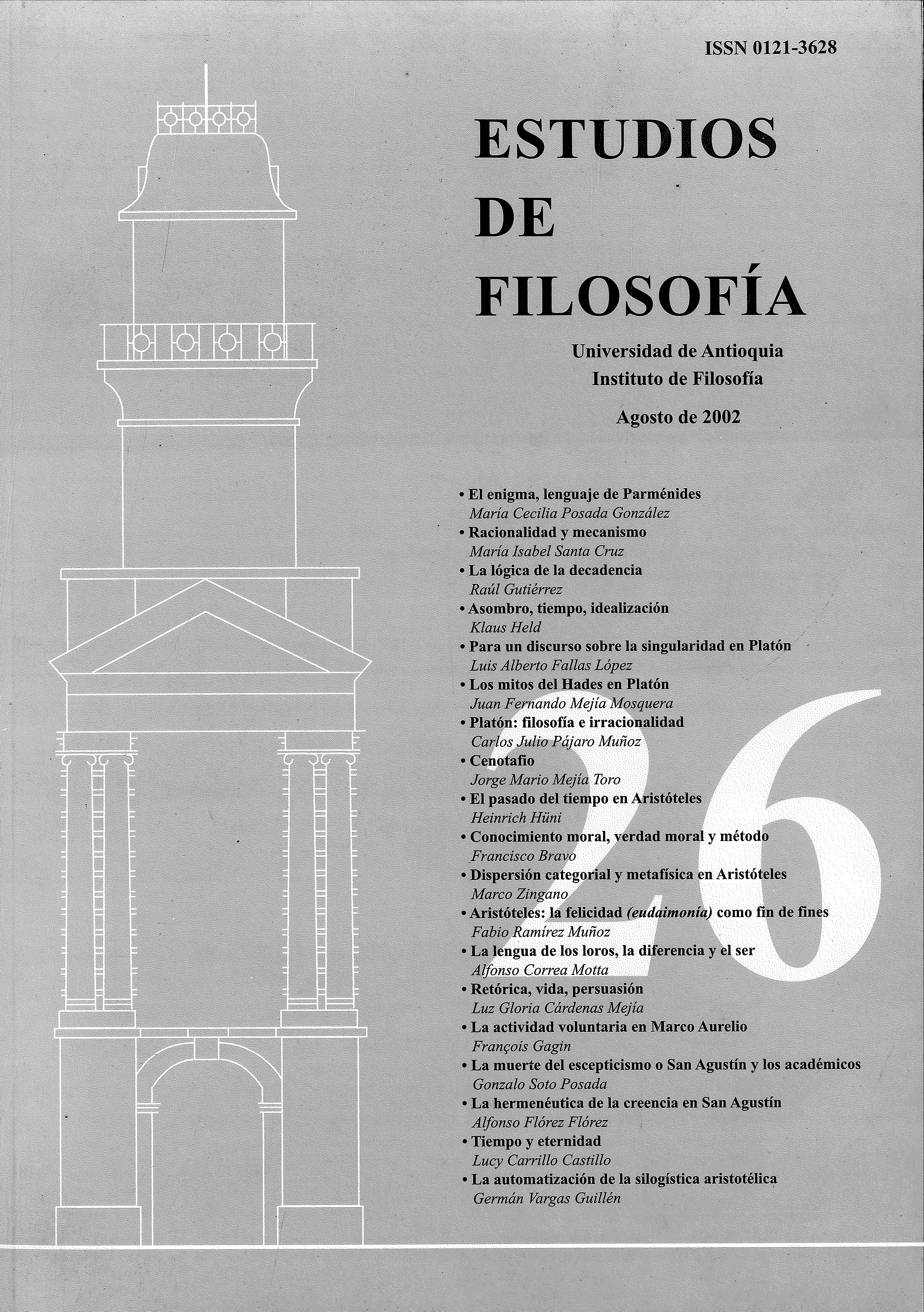Rationality and Mechanism. A Reading of Statesman and Laws X
DOI:
https://doi.org/10.17533/udea.ef.14966Keywords:
Plato, rationality, mechanism, cosmos, Statesman, lawsAbstract
In Statesman (268d-277); the fiction story of the periodical reversion of the universe expresses the existence of two forces in the universe or two tendencies of occurrence. One that guides the world and man towards his télos, which is the most perfect, and the tendency towards disorder and confusion, in other words, just mechanical and risky. Purpose and mechanism, the two tendencies present in Timaeus, reappear in book X of Laws under the form of a good soul and a bad soul. The former is the one that recounts the rational movement of the world and the latter is the causer of the mad and irregular movement (897c-d). In Statesman, the tendencies, or ruling forces of the universe, alternate their predominance, they are in tension. In addition, it is the measure of that alternation, which saves the worldfrom destruction and it makes it stay- balanced. This game of tensions translates the existence of a proportionality in the heart of the universe: thanks to which the world is precisely a Kósmos. In Timaeus, balance results from the persuasion that intelligence exerts on necessity, guiding it towards the best. This idea also reappears in Laws; in 906a: this balance consists on a tension between that which is rational and that which is irrational in the universe.
Downloads
Downloads
Published
How to Cite
Issue
Section
Categories
License
Copyright (c) 2002 María Isabel Santa Cruz

This work is licensed under a Creative Commons Attribution-NonCommercial-ShareAlike 4.0 International License.
Authors who publish with this journal agree to the following terms:
1. The Author retains copyright in the Work, where the term "Work" shall include all digital objects that may result in subsequent electronic publication or distribution.
2. Upon acceptance of the Work, the author shall grant to the Publisher the right of first publication of the Work.
3. The Author shall grant to the Publisher a nonexclusive perpetual right and license to publish, archive, and make accessible the Work in whole or in part in all forms of media now or hereafter known under a Creative Commons Attribution-NoCommercia-ShareAlike (CC BY-NC-SA 4.0), or its equivalent, which, for the avoidance of doubt, allows others to copy, distribute, and transmit the Work under the following conditions: (a) Attribution: Other users must attribute the Work in the manner specified by the author as indicated on the journal Web site;(b) Noncommercial: Other users (including Publisher) may not use this Work for commercial purposes;
4. The Author is able to enter into separate, additional contractual arrangements for the nonexclusive distribution of the journal's published version of the Work (e.g., post it to an institutional repository or publish it in a book), as long as there is provided in the document an acknowledgement of its initial publication in this journal;
5. Authors are permitted, and Estudios de Filosofía promotes, to post online the preprint manuscript of the Work in institutional repositories or on their Websites prior to and during the submission process, as it can lead to productive exchanges, as well as earlier and greater citation of published work (see The Effect of Open Access). Any such posting made before acceptance and publication of the Work is expected be updated upon publication to include a reference to the Estudios de Filosofía's assigned URL to the Article and its final published version in Estudios de Filosofía.















